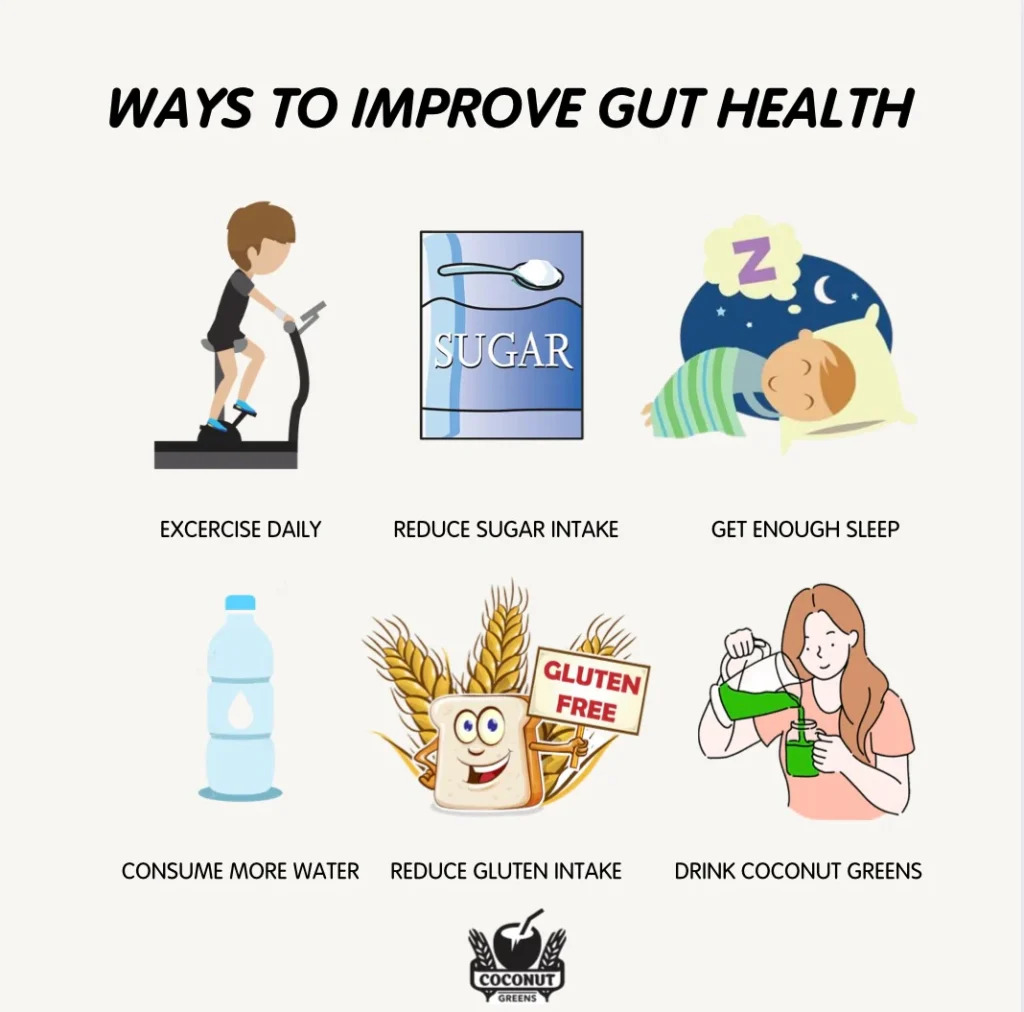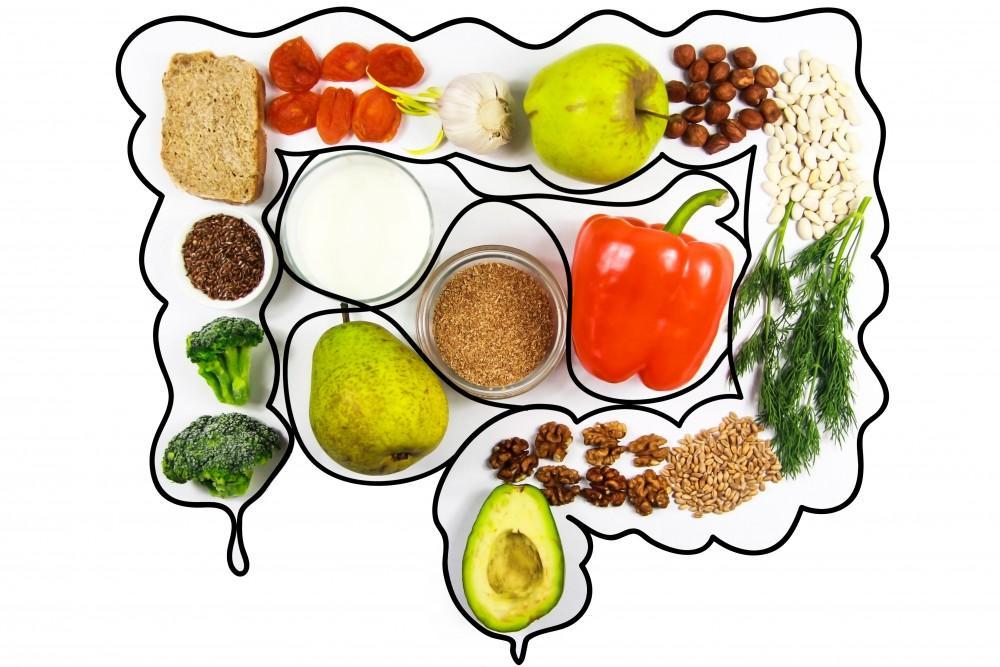
Gut health refers to the balance and proper function of microorganisms in the digestive tract that support digestion, immunity, and mental well-being. A healthy gut reduces inflammation, supports metabolism, and protects against chronic diseases.
Key Takeaways
- Gut inflammation occurs when the intestinal lining is irritated or damaged.
- Processed foods, stress, and poor sleep are major causes of gut imbalance.
- Diet diversity, probiotics, and prebiotic foods enhance microbial balance.
- Anti-inflammatory foods like berries, leafy greens, and fatty fish support healing.
- Stress management, exercise, and quality sleep strengthen gut function.
- Limiting antibiotics, alcohol, and refined sugars prevents long-term dysbiosis.
What Is Gut Health and Why Is It Important?
Gut health refers to the balance and function of the trillions of microorganisms in your digestive system. These bacteria, viruses, and fungi collectively called the gut microbiome are essential for:
- Breaking down food and absorbing nutrients
- Regulating the immune system
- Supporting brain function and mood
- Preventing infections and inflammation
What Is Gut Inflammation?
Gut inflammation is the immune system’s response to injury, infection, or irritation in the digestive tract, mainly the small and large intestines. When this happens, the lining of the gut becomes swollen, irritated, or damaged. This can cause digestive symptoms and sometimes affect the whole body.
- The gut lining reacts to harmful triggers such as infections or irritants. Inflammation is the body’s natural defense, but if it lasts too long or is too strong, it harms healthy gut tissue.
- Gut inflammation can be short-term (acute), usually from infections or food poisoning, or long-term (chronic), as seen in diseases like Crohn’s disease and ulcerative colitis, which are forms of inflammatory bowel disease (IBD).
What Causes Gut Inflammation?
Gut inflammation can occur due to:
- Dietary factors: Consuming processed foods, refined sugars, and high-fat diets.
- Medications: Overuse of antibiotics, nonsteroidal anti-inflammatory drugs (NSAIDs), or proton pump inhibitors (PPIs).
- Lifestyle choices: Excessive alcohol consumption, smoking, and lack of sleep.
- Stress: Chronic stress disrupts the gut-brain connection, triggering inflammation.
Ways to Improve Gut Health & Reduce Inflammation

There are several ways to improve gut health and reduce inflammation. Here we will discuss 10 ways to improve gut health and reduce inflammation.
1. Eat a Diverse, Whole-Food Diet
Microbial diversity is a hallmark of a healthy gut. Improved diversity helps maintain balance, suppress harmful bacteria, and support overall health.
- Aim for variety: Strive to eat 30+ different plant-based foods weekly, including vegetables, fruits, legumes, nuts, seeds, and herbs.
- Prebiotic-rich foods: Garlic, onions, leeks, asparagus, and bananas fuel healthy gut bacteria.
- Polyphenols for the microbiome: Include berries, green tea, olive oil, and dark chocolate for their powerful antioxidant and gut-supporting properties.
- Resistant starches: Add cooked-and-cooled potatoes, green bananas, and lentils, which reach the colon undigested and feed good microbes.
2. Use Probiotics for Gut Health
Probiotics are live, beneficial microorganisms that help restore microbial balance and support gut integrity.
Key probiotic strains:
- Lactobacillus rhamnosus GG: Enhances gut lining and immune function
- Bifidobacterium longum: Reduces inflammation
- Lactobacillus plantarum: Strengthens the gut barrier
- Saccharomyces boulardii: Protects against harmful pathogens
- Bifidobacterium infantis: Reduces IBS symptoms and systemic inflammation
- Fermented foods: Yogurt, kefir, kimchi, sauerkraut, miso, kombucha
- High-quality supplements: Aim for 10+ billion CFUs, covering several strains.
3. Prioritize the Best Foods for Gut Health
Select foods proven to nourish beneficial bacteria and build a resilient gut:
- Leafy greens (spinach, kale)
- Fermented foods (see above)
- Berries (antioxidant-rich)
- Bone broth (contains amino acids like glutamine for repair)
- Fatty fish (salmon, sardines, rich in omega-3s)
- Turmeric and ginger (natural anti-inflammatories)
| Anti-Inflammatory Foods | Pro-Inflammatory Foods |
| Leafy greens (spinach, kale) | Processed sugars |
| Berries (blueberries, raspberries) | Refined grains (white bread) |
| Nuts (walnuts, almonds) | Red and processed meats |
| Sweet potatoes | High-fat dairy products |
| Whole grains | Fried and salty foods |
4. Avoid the Worst Foods for Gut Health
Certain foods undermine gut barrier function and foster harmful bacteria, particularly problematic for those with autoimmunity.
- Refined sugars, artificial sweeteners
- Processed foods and additives (emulsifiers, preservatives)
- Gluten and dairy (if sensitive)
- Fried or fast food
- Excess alcohol and caffeine
- Large amounts of red and processed meat
5. Manage Stress Levels
Chronic stress increases levels of the hormone cortisol, which can disrupt the balance of your gut microbiome and weaken the protective gut barrier. To support gut and immune health, integrate regular stress management practices:
- Meditation and deep breathing: Calms the nervous system and reduces stress hormones.
- Yoga, walking, and time in nature: Physical movement and exposure to natural environments reduce psychological stress and benefit gut diversity.
- Journaling and gratitude practices: Help process emotions and cultivate a positive mindset, further lowering stress’s physiological impact.
6. Prioritize Quality Sleep
Quality sleep is essential for gut microbial stability and effective immune function.
- Target 7–9 hours each night: Sleep enables repair and balancing of gut bacteria.
- Limit screen time before bed: Blue light can disrupt sleep hormones.
- Maintain a consistent schedule and environment: Stick to regular bedtimes and create a cool, dark, quiet space to support restful sleep.
7. Exercise Regularly
Moderate, consistent exercise encourages a more diverse and balanced gut microbiome and reduces inflammation.
- Aim for 30 minutes of activity daily: Walking, swimming, or cycling are excellent choices.
- Avoid overtraining: Excessive exercise can damage the gut barrier and impair immune response. Balance movement with adequate rest.
8. Use Antibiotics and Medications Wisely
While sometimes necessary, antibiotics can eliminate both beneficial and harmful gut bacteria.
- Take only as prescribed: Avoid unnecessary antibiotic use.
- Replenish good bacteria: After a course, consume probiotic-rich foods or supplements.
- NSAIDs caution: Medications like ibuprofen can irritate the gut lining sparingly and consult your healthcare provider for alternatives.
9. Consider Functional Testing
If you experience ongoing digestive or immune issues:
- Consult a functional medicine provider: Specialized practitioners can assess gut health more comprehensively.
- Investigate imbalances: Testing can reveal gut microbiome disruptions, increased intestinal permeability (“leaky gut”), food sensitivities, and nutrient deficiencies so you can receive personalized recommendations.
10. Limit Sugar and Artificial Sweeteners
Reducing sugar and artificial sweeteners is vital for gut health, as they disrupt the microbiome and promote inflammation. Excess sugar feeds harmful bacteria, while artificial sweeteners like aspartame reduce beneficial microbes. Go for natural sweeteners in moderation to support a healthier gut.
Dos and Don’ts for a Healthy Gut
A balanced gut promotes better digestion, immunity, and overall well-being, especially as we age. Use the table below for practical tips on what to do and what to avoid for healthy gut function.
| Dos for Gut Health | Don’ts for Gut Health |
| Eat high-fiber foods (whole grains, fruits, veg) | Rely on processed snacks and sugary foods |
| Include fermented foods (yogurt, kimchi, kefir) | Overuse antibiotics unnecessarily |
| Stay hydrated by drinking water consistently | Skip hydration or drink too many sugary sodas |
| Choose anti-inflammatory foods (berries, fish, nuts) | Eat lots of red meats and fried foods |
| Diversify your diet with various plant foods | Stick to the same restricted food routine |
| Exercise regularly brisk walks, swimming, or cycling | Lead a consistently sedentary lifestyle |
| Manage stress with breathing or gentle activities | Ignore long-term stress and poor coping habits |
| Get 7–8 hours of quality sleep each night | Sacrifice rest and have irregular sleep patterns |
| Focus on prebiotics (bananas, garlic, onions) | Avoid fresh produce and fiber-rich foods |
| Seek medical advice for ongoing gut symptoms | Self-diagnose persistent digestive complaints |
Conclusion
A healthy gut is the foundation of overall well-being, influencing everything from digestion to immunity and mood. By incorporating the 10 strategies outlined in this article such as eating anti-inflammatory foods, managing stress, staying hydrated, and prioritizing sleep you can nurture your gut and reduce inflammation.
Small, consistent changes to your diet and lifestyle can lead to significant improvements in gut health. Start with one or two strategies, gradually adding more, and enjoy the benefits of a healthier, more balanced gut.
FAQs
Can gut health impact mental well-being?
Yes, the gut-brain axis connects digestive health and mood; imbalanced gut bacteria can influence anxiety and mood swings.
What signs suggest poor gut health?
Common symptoms: bloating, constipation, diarrhea, frequent fatigue, skin rashes, and persistent stomach discomfort.
Are all fermented foods good for everyone?
Most people benefit, but those with lactose intolerance or food sensitivities should select suitable types and quantities.
How soon can I notice improvements after changing habits?
Some notice better digestion within weeks, but lasting gut health and reduced inflammation require ongoing lifestyle changes.
What are prebiotics, and why are they important?
Prebiotics are fibers that feed good gut bacteria, found in foods like garlic, onions, leeks, and bananas.
Is it necessary to take supplements for gut health?
Not usually most people can achieve a healthy balance through food. Consult a healthcare provider before using probiotics or other supplements.
Which drinks are best for the gut?
Plain water is optimal, but herbal teas (like ginger and peppermint) may soothe digestion. Limit sugary or carbonated beverages.
Do antibiotics harm gut health?
They can disrupt beneficial bacteria, so only use antibiotics when prescribed and consider probiotics during recovery.
Should I avoid all fats for gut health?
No. Unsaturated fats from fish, nuts, seeds, and olive oil are beneficial, while limiting trans and saturated fats aids gut health.
Does age require special considerations for gut health?
Yes, older adults may have slower digestion and less stomach acid. Prioritize hydration, fiber, variety, and regular medical check-ups.
Reference
- Harvard Health – 5 Simple Ways to Improve Gut Health
Harvard Health - Verywell Health – 9 Probiotic Drinks for a Healthier Gut
Verywell Health - EatingWell – 7-Day High-Protein, Gut-Healthy Meal Plan
EatingWell - New York Post – 5-Step Approach Can Lead to a Healthier Gut and Stronger Immunity
New York Post - Harvard Health – Foods That Fight Inflammation
Harvard Health - Health – 9 Healthy Eating Tips That Can Help Reduce Inflammation
Health UC Davis
Dr. Emily Zhang, MD, is a gastroenterologist and integrative medicine specialist with 10 years of clinical experience in digestive health and microbiome science. She completed her medical degree at University of Chicago Pritzker School of Medicine and fellowship at Massachusetts General Hospital. Dr. Zhang specializes in gut-brain interactions, microbiota diversity, and nutrition-driven gut repair. She has contributed to NIH-funded studies on probiotics and authored patient education resources on functional gut disorders.


